A salute to the Bhisma Pitamaha

Revered as the ‘father of Indian Peasant Movement’ (after Swami Sahajanand Saraswati) for his relentless pursuit in this regard, Prof NG Ranga belongs to the fast vanishing tribe of political stalwarts, who championed the cause of peasants, weavers and the neglected lot.
Revered as the ‘father of Indian Peasant Movement’ (after Swami Sahajanand Saraswati) for his relentless pursuit in this regard, Prof NG Ranga belongs to the fast vanishing tribe of political stalwarts, who championed the cause of peasants, weavers and the neglected lot. I vividly remember the time when I accompanied Bezawada Gopala Reddy on a visit to the samadhi of Prof Ranga at his native Nidubrolu village in Guntur district and paid obeisance to the great soul.
Sheela Bhadrayaji, Nijalingappa and Dr B Gopala Reddy have all passed away leaving behind a rich and enlightening legacy. They like, Hiren Mukherji, an astute parliamentarian, and Baba Amte, a pre-eminent social reformer, never aspired for positions of pelf or power. Prof Ranga, a legendary figure in Indian politics, is an institution by himself, particularly for his selfless sacrifices while crusading against the woes faced by agriculturists and fighting for their rights.
Tremendously influenced by industrialist-bureaucrat Velagapudi Ramakrishna, Prof Ranga took his B. Litt degree from Oxford University. Taking along Bharati Devi Ranga, he visited Italy, Germany and France in 1922. He joined Pachaiyappa's College, Madras as a professor of Economics. The later day prominent personality, C Annadurai, was under the influence of Prof Ranga, during those days.
Despite starting Swatantra Party, along with C Rajagopalachari (Rajaji), Bezawada Ramachandra Reddy and Mino Masani, as an alternative to the National Congress Party, Prof Ranga remained an unassuming kisan leader, who led several movements seeking amelioration of the living conditions of peasants, weavers and labourers.
The Swatantra Party was strongly opposed to the Nagpur Resolution of the Congress (I) Party that called for starting cooperative farming and Jawaharlal Nehru favouring socialism for establishing an egalitarian society. When Prof Ranga contested as a Swatantra Party candidate in a by-election against TN Viswanatha Reddy of the Congress, we all were drafted as soldiers for this sangram.
Our valiant electioneering bore fruit as Rangaji was declared elected by a margin of 1500 votes, thanks largely to the Reddy population in Vepanjeri segment, which tilted the scales. Rajaji campaigned for Prof Ranga while the entire Andhra Pradesh State machinery worked for the ruling party candidate.
Prof Ranga entered the Central Legislative Assembly in 1930 along with exemplary Parliamentarians like GB Pant and Satyamurthy. He was a member of the Parliament for half-a-century. On April 28, 1982, he was honoured by Indira Gandhi on his golden jubilee that entered the Guinness Book of the World Records.
Opposed to Communism, he was a Gandhian, who fought against the oppressive Zamindari and feudal system. He contended that the Nagpur Resolution of the Congress in bringing about cooperative farming sounded the death-knell for the peasantry. It was only because of his persuasive crusade against government policies that the men in authority fixed remunerative prices for agriculturists and adopted the crop insurance scheme.
When he was offered a ministerial berth by Jawaharlal Nehru, he not only declined it but also insisted that free movement of food grains between States should be permitted. He and Rajaji denounced the permit license quota Raj and sought to establish a popular and liberal government under the Swatantra Party.
I was so inspired by Prof Ranga that I entered politics and also resolved never to take up a job either in the government or in the private sector. On his advice, I contested in the General Elections as a Swatantra Party candidate in 1962 and 1967 and later in 1978. Though, I lost by a narrow majority in 1962, I knew every voter by name in the constituency. In 1967, I won with an unparalleled Legislative Assembly record majority, much like the Parliament record set by Maharani Gayatri Devi!
When I was set to become a Speaker, my mentor extolled me to uphold parliamentary traditions, while exhorting that “Speakership of an Assembly is a coveted assignment and above a ministerial post in the sense that the Chair draws appreciation of all parties and not merely from the Treasury benches”.
Once when Telugu superstar Krishna invited Prof Ranga to inaugurate his Lok Sabha poll campaign in Tenali, the great man bluntly refused to take part in the campaign while adding “as a matter of principle, I will never campaign for cine stars”. That was Prof Ranga, ‘a valiant fighter for human freedom and dignity’.
Prof Ranga’s life and mission shall remain a source of inspiration to men and women all over the world. This is the homage one can pay as a tribute to Prof Ranga and emulate his ideals. I feel blessed as that is precisely what I have always endeavoured in my life. (The writer is a former Speaker of AP Legislative Assembly)
By Dr Agarala Eswara Reddi








